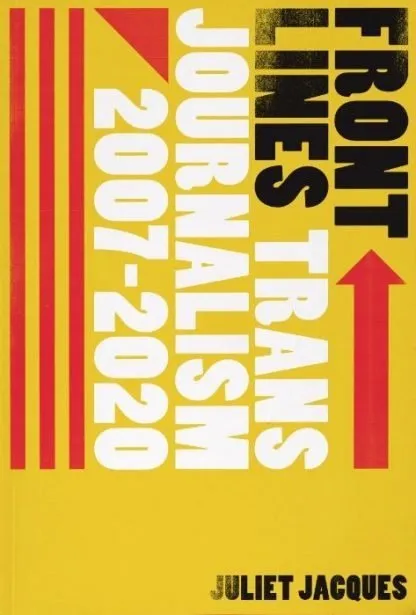| Weight | 332 g |
|---|
Front Lines: Trans Journalism 2007-2020 – Juliet Jacques
£11.99
Casgliad arloesol o newyddiaduraeth ar gelf, gwleidyddiaeth a diwylliant gan Juliet Jacques, un o awduron traws mwyaf arloesol y DU.
Juliet Jacques oedd un o awduron traws cyntaf yn y DU i gyfrannu’n eang i’r cyfryngau Prydeinig a thramor, gan ysgrifennu am y profiad traws. Yn ymestyn dros ddegawd, mae newyddiaduraeth arloesol Jacques am hunanoldeb, cymdeithas, celf, gwleidyddiaeth, rhyddid a hunaniaeth rhywedd yn dilyn yr adlach yn erbyn hawliau traws a thwf cyfryngau traws newydd.
Mae Front Lines yn gasgliad arloesol o ysgrifau ar gelf, gwleidyddiaeth a chyfryngau traws a cwiar o gyfnod gythryblus i bobl traws ac anneuaidd yn y cygryngau Prydeinig. Mae’r casgliad hollbwysig hwn yn gofyn beth y gallwn ei ddysgu o’r degawd diwethaf a beth y gallwn ei wneud nawr. Sut gall awduron newydd fynd i’r afael â’r frwydr am ryddhad traws? A sut olwg fydd ar ddyfodol ysgrifennu traws?
A seminal collection of journalism on art, politics, and culture, by Juliet Jacques, one of the UK’s most pioneering transgender writers.
Juliet Jacques was one of the first trans writers in the UK to contribute broadly to both British and foreign media, writing widely about the trans experience. Spanning over a decade, Jacques’ ground-breaking journalism about selfhood, society, art, politics, freedom, and gender identity, tracks the backlash against emerging trans rights and the rise of a new and more explicit form of media transphobia.
Front Lines is a seminal collection of writings on trans and queer art, politics, and media, from a period in which the relationship between trans and non-binary people and the British media was exceptionally turbulent. Jacques navigates the tension between wanting to simply write about art and culture and needing to counter the dishonest, damaging rhetoric being published about trans people in virtually every national newspaper in the UK. “I never believed any journalism was objective, nor that there was any point in even trying to be,’ writes Jacques in her introduction. ‘Above all, activism is needed to fight this, with journalism to support it: there is no point in pretending to be objective in our work, as the stakes remain just as high as they were back in 2010, perhaps even higher… We’re entering a new phase of collective struggle, with new fronts and new tactics needed: I hope this book can help to inform that.’
This crucial collection asks what we can learn from the last decade and, importantly, what we can do now. How can new writers take up the struggle for trans liberation? And what will the future of trans writing look like?





